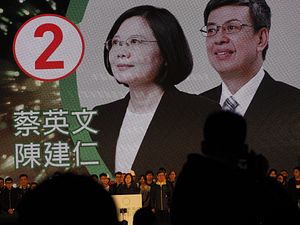On January 16, as polls had predicted, the Democratic Progressive Party (DPP) handily won the presidency back from the Kuomintang (KMT), with DPP candidate Tsai Ing-wen winning 56 percent of the vote. The DPP also won its first-ever majority in Taiwan’s legislature, picking up 68 out of 113 seats. Those results usher in a new political era in Taiwan; never before has the DPP scored such a huge electoral victory in national polls.
Now that Taiwan has voted, Beijing also has a choice to make: how it will respond to the definitive ouster of the KMT, its preferred partner for cross-strait relations. Ever since Chen Shui-bian, the last DPP president, was in office from 2000 to 2008, Beijing has equated DPP with ‘Taiwan independence’ and ‘splittism.’ How will Beijing interact with a Taiwan that is solidly ruled by the DPP?
The official response from the State Council’s Taiwan Affairs Office, the government body responsible for cross-strait relations in Beijing, began by noting the strides made over the past eight years (since President Ma Ying-jeou came to power). The statement emphasized that the framework for cross-strait cooperation was built on the “political foundation of holding fast to the ‘1992 Consensus’ and opposing ‘Taiwan independence.’” The current “favorable situation” in cross-strait relations did not come easily, the TAO noted, and must be “cherished.”
The TAO also reiterated that Beijing’s approach to Taiwan would not change due to the election results: “We will continue to hold fast to the ‘1992 Consensus’ and firmly oppose ‘Taiwan independence’ splittist activities in whatever form.” The TAO added that Beijing was willing to strengthen exchanges and contact with any political party or group that “recognizes the two sides of the Taiwan Strait both belong to one China.”
China’s Foreign Ministry was more pointed in their statement, with spokesperson Hong Lei enlisting the aid of the rest of the world in preventing any move toward “Taiwan independence.” Hong emphasized that “the result of the election in Taiwan will not change the basic fact and the consensus of the international community” – that consensus being that “both the mainland and Taiwan belong to one China.”
“On such a major issue as safeguarding state sovereignty and territorial integrity, the Chinese government has rock-solid determination and never tolerates any separatist activities aiming at ‘Taiwan independence,’” Hong continued. “We hope and believe that the international community will adhere to the One-China Principle, stand against any forms of ‘Taiwan independence,’ and support, with concrete actions, the peaceful development of the cross-Strait relations.”
Joseph Wu, the secretary-general of the DPP, said in remarks at the Center for Strategic and International Studies in Washington, D.C., that Beijing’s comments on cross-strait relations (both before and after the election) had been “relatively reserved.” He attributed this response to two factors: the DPP decision not to target China in its campaigning, and Beijing having months to resign itself to the DPP taking power. Wu called Beijing’s “measured” reaction a first positive step for cross-strait ties after the election.
Wu was also cautious to frame the election results as a referendum on domestic issues, not cross-strait relations. “The cross-strait issue was not a salient issue in the campaign and therefore was not the issue defining the election result,” he said. That interpretation fits with Tsai’s repeated assertions that she will maintain the “status quo” of cross-strait relations, rather than seeking to overturn Ma’s policies.
However, there are changes in store for the cross-strait relationship. First, while Tsai has not outright renounced the “1992 Consensus,” she doesn’t seem keen to embrace it, either. Wu broached the issue in his remarks at CSIS. Rather than agreeing with the “1992 Consensus” as defined by the KMT and Beijing, Wu said, Tsai “advocates a return to the original spirit of ‘setting aside differences to seek common ground’ that formed the basis of the 1992 cross-strait meetings.”
“Going forward, we will do our utmost to find a mutually acceptable mode of interaction between Taiwan and the mainland, one that avoids confrontation and prevents surprises,” Wu added. Left unspoken is the implication that the “1992 Consensus” is not such a “mutually acceptable mode of interaction.”
Beijing, which has repeatedly insisted upon the “1992 Consensus” as the only foundation for continued cross-strait ties, will have to choose being insisting upon that red line or moving forward with cross-strait relations using a different formula. There was some cause for optimism that Beijing will opt for the latter, given the TAO’s comment that it will pursue relations with any party that acknowledges “one China” — potentially leaving the door open for an alternative formula that somehow satisfies both sides.
Wu also noted that passing Cross-Strait Agreement Oversight legislation would be a “top priority” for the new DPP-led Legislative Yuan during its first 100 days. The DPP’s majority in the LY will become a reality on February 2, when the newly elected legislators take their seats (meanwhile, Tsai herself won’t assume office until May 20).
Legislation creating oversight for cross-strait agreements was a major demand of the Sunflower Movement protesters, who argued that deals like the Cross-Strait Services Trade Agreement were created within a “black box,” with no public oversight. The DPP, which has long accused the KMT of conducting cross-strait negotiations on a “party to party” basis, took up the call to institutionalize oversight of cross-strait ties.
Once passed, as it’s almost sure to do thanks to the DPP’s new majority, the oversight legislation will permanently alter the way Taiwan and mainland China interact. In a roundabout way, Beijing will find itself accountable to a voting public, as Taiwan’s legislators (rather than the political appointees at the Mainland Affairs Council) get more control over cross-strait relations.

































